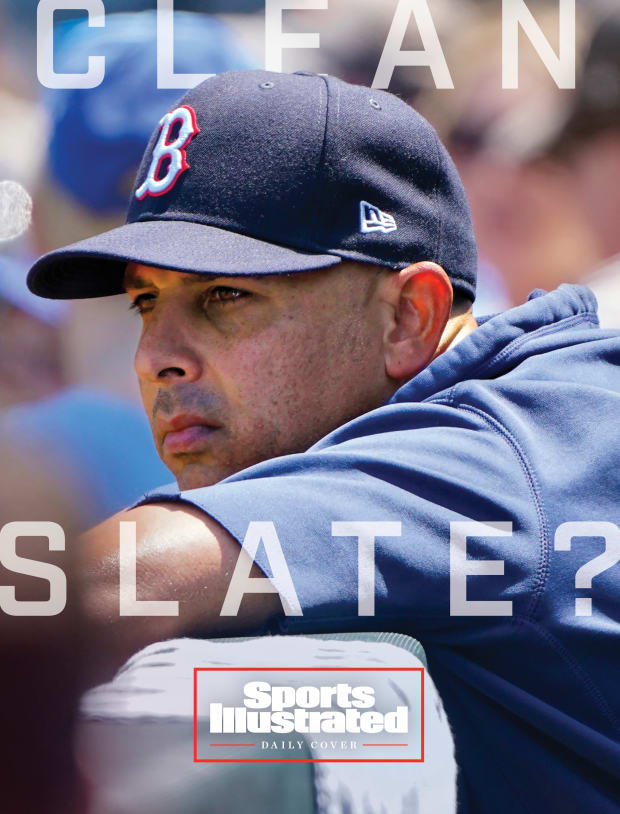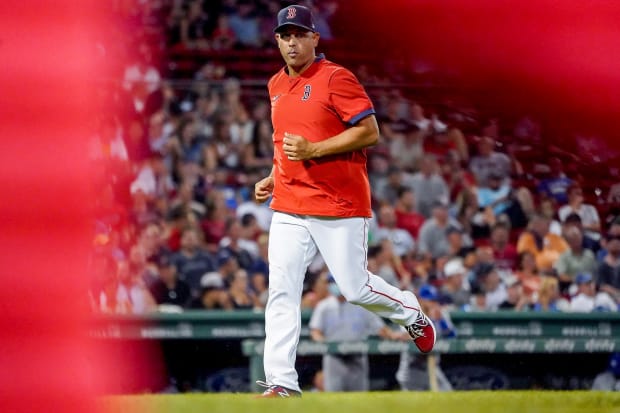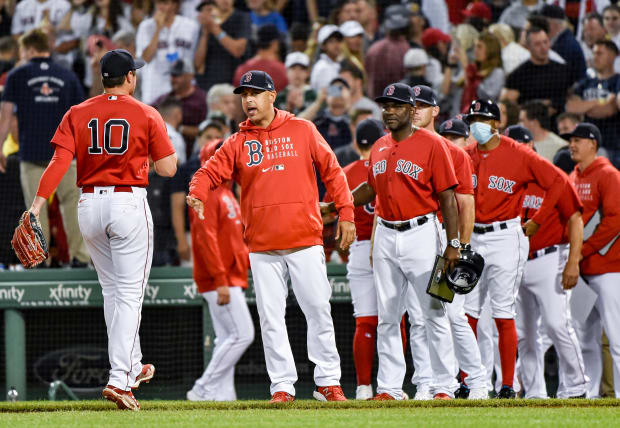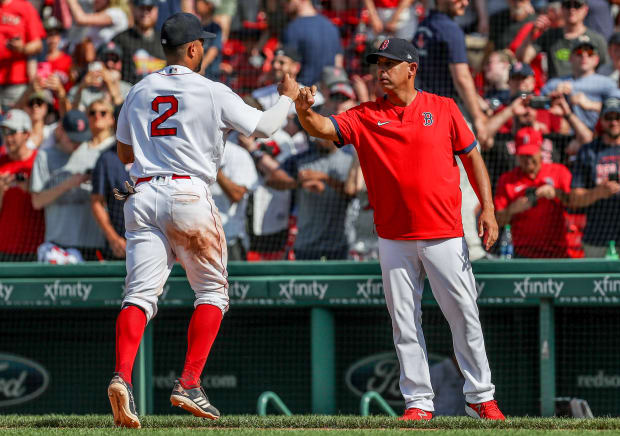The Red Sox manager knows winning now doesn’t erase his cheating with the Astros. And he’s O.K. with that.
It may look as if he never left. There is Alex Cora in the Red Sox dugout, calmly running a game with the touch and equanimity of a jeweler. “It’s like he’s got a crystal ball,” says Boston shortstop Xander Bogaerts. And there are the Red Sox, an awful, doleful 24–36 outfit last year without Cora, playing inspired, winning baseball again with him.
But deep down, in that place in your soul where priorities align, this is not the same Cora. Getting kicked out of the game you love can do that to a fellow.

“I’m good at turning the page,” Cora tells Sports Illustrated. “I’m good at separating things. But I’m most glad that the people who benefited the most out of this ordeal is my family. I don’t have to spend hours watching video. I don’t have to spend hours going over reports. I trust my coaches. I always did, but before I also always wanted to be hands-on.
“I learned—and I knew it before, but more so now—it’s just a game. I love the fact that my family, they benefited from all the mistakes I’ve made. It’s made me a better person. It’s made me better in everything. I am so appreciative. It’s made me more patient.”
His partner, Angelica Feliciano, agrees.
“Si, mucho,” she says. “And not only because of his punishment. It’s also because of spending one year with three-year-old twins, especially during the lockdown here in Puerto Rico for six full months. He was teaching the kids. Preschool. He was the one home schooling. He also did potty-training.”
Cora was the only person disciplined for playing an active role in the Astros’ 2017 sign-stealing scandal. Baseball commissioner Rob Manfred barred him from the 2020 season for being among those who “originated and executed” the scheme. Cora, Houston’s bench coach in 2017, was promptly fired by the Red Sox as their manager.
Manfred also suspended for a year Houston manager A.J. Hinch and general manager Jeff Luhnow for a failure to act in their roles as senior baseball operations executives. The Astros promptly fired both. Hinch was hired as Detroit Tigers manager before this season. Luhnow has not worked again in baseball. He sued the club for $20 million in damages. That suit was dismissed earlier this year after the two sides “resolved their differences.”
Cora, 45, and Hinch, 47, both say they are changed for the better by the public embarrassment and punishment. Both are succeeding in their return to the dugout. Under Cora, the Red Sox are 61-39 and in first place in the American League East entering Monday. Under Hinch, the Tigers recovered from a 9–24 start and have since gone 38–30.

“I have had a long season away from it, or a short season, however you want to look at it,” Hinch says. “I realized, after reviewing it with my wife and daughters, that it showed the vulnerability that I had—where the off-ramps were where you could have done something different, where there was a failure of leadership. I liked to think that I handled every situation perfectly, but I didn’t on this. I kept repeating, ‘wrong is wrong.’
“I didn’t expect it to be easy [to be out of baseball]. I’m still impacted by it. I’ll never forget the feeling of failure. I don’t ever want to lose that feeling. It will make me a better leader. It’s necessary to be reminded that I made a mistake and I’ll move forward. I won’t let it get too far away from me.”
It was Hinch who brought Cora back to a uniformed role in baseball. Hinch needed a bench coach to replace Trey Hillman, who took a job managing in Korea after the 2016 season. Cora was working as an analyst for ESPN.
“I didn’t know him well, other than being around baseball and being a similar age, we knew a lot of the same people,” Hinch says. “I knew he was one of the best baseball minds in the game, and his ability to connect with players in any job was a great asset. Just as you look for impact players, you look for coaches who can make an impact. He clearly stood out as someone who was.”
Cora had not been in uniform since being released by the Cardinals out of 2012 spring training. In the years he was out of the dugout, in-game video feeds entered baseball. Players could watch live feeds of the game on monitors installed in hallways or clubhouses near the dugout. The easy temptation, and his ability and desire to connect with players as someone recently in their shoes—a key reason he was hired—proved to be his undoing.
Only weeks into his first season back in uniform, Cora emerged as a mastermind and major participant in one of the game’s great scandals. According to the commissioner’s findings, Cora ordered a video room technician to install near the dugout a monitor that showed a constant feed from a center field camera. He developed the trash-can signaling system to alert Houston hitters which pitch was coming. He used the dugout phone to call the replay room to get the signs himself.
Details of the scheme did not emerge until after the 2019 season. By then, Cora had won a World Series championship as a rookie manager with the 2018 Red Sox. When Boston fired him, Cora says, he thought he would be out of the game for more than the one-year duration of his suspension.
“At one point I didn’t think I would manage this soon again,” he says. “I thought I was going back to Bristol [and ESPN]. I thought doing TV was going to be my next and only option.
“Plus, there were only three [managing] jobs open, and two of them were taken pretty quickly.”

On Oct. 29, 2020, the White Sox hired Tony La Russa. The next day, the Tigers hired Hinch, a move Detroit put in place a half hour after Hinch’s suspension ended with the last out of the World Series.
“It was 30 minutes after and they said, ‘Can you get on a plane tomorrow?’ ” Hinch says. “They said, ‘Are you prepared?’ I said, ‘I’ve had nine months to prepare.’ I was on a plane the next morning.”
In a private room at a restaurant just outside of Detroit, Hinch met over dinner with Tigers Chairman and CEO president and CEO Chris Ilich, general manager Al Avila, assistant general manager David Chadd, senior director of baseball analytics Jay Sartori, and director of baseball operations Sam Menzin.
“The first night of the interview it was obviously the elephant in the room,” Hinch says. “It was a major topic with them. But I never felt like Al or Chris were after intimate details. It was more of, ‘What have you learned? What are the main takeaways? How can I be sure it won’t happen on our watch?’
“And I wanted to start our relationship with full transparency and openness. I knew it is a topic that I will have to deal with forever. This is an enormous job. I’m really focused on what I need to do, not try to tell people what they should believe.”
Now, only one managerial role position remained open: the Boston job. On that same day, Red Sox chief baseball officer Chaim Bloom and general manager Brian O’Halloran flew to Puerto Rico to meet with Cora.
“People thought [the job] was there for me,” Cora says, “but the process, it was a tough one.”
Bloom and O’Halloran sat with Cora at a table in a freezing airport hangar in Puerto Rico. The meeting lasted five hours, with only water and conversation to sustain them.
“It was very intense,” Cora says. “Chaim wanted to know more about me, especially after not having any communication throughout the year. I had worked with Chaim only three months before that. It was about establishing relationships and getting to know each other.
“Meeting in Puerto Rico, it made it comfortable for me that it was in my yard. If it didn’t go my way, I could just go home.
“It went well. We had one more conversation after that one. It was very personal. Really good. But I still didn’t know. I didn’t know where they were going.”
On Nov. 6, the Red Sox re-hired Cora as their manager. What was not yet apparent was how much the year out of baseball had redefined Cora, a man known as much for his molten intensity on the field as his intellect and instincts. He had literally grown up around the game, often falling asleep as a child on the floor of the press box of Yldefonso Solá Morales Stadium in Caguas, Puerto Rico, where his dad covered winter ball as a newspaper columnist and served as a scout for the Rangers and Padres. Despite an OPS+ of 72, Cora lasted 14 years and more than 1,200 games as a major league player, making him one of only 21 players to last so long with such below average hitting. His staying power was due more to his intangibles—competitiveness, leadership, and versatility—than his bat. When he first tried managing in winter ball, he quit after one season to stick to GM duties because he was too intense running a game.
Last year brought a new perspective. Out of the game he loved, Cora devoted himself to family. His daughter from his first marriage, Camila, was preparing for her senior year of high school. (Cora left the Red Sox last May to attend her graduation.) The twins, Xander and Isander, occupied much of his time. Angelica says he also discovered new fashions, and a new hobby: grilling. “Bell peppers are one of his specialties,” she says. The intense rhythm of his baseball life, grinding out wins and dwelling on losses, quieted.
“One thing I learned from the suspension is being more patient,” he says. “To have twin boys three years old, and you have to deal with lockdowns and curfews and masks and everything that came with the pandemic, we had to be patient, me and Angela. Plus, we were going through Camila’s college process. That was eye-opening. I have a stepson and he was opening his own business, and to see him succeed or fail you have to be patient. I needed to be patient.”

He watched baseball from an outsider’s perspective, and learned from it, especially in the postseason. Three lessons became clear to him.
Number one, he wanted a former catcher to run Boston’s in-game pitching strategy.
“I saw that last year with the Rays and the Dodgers how important that can be,” Cora says. “I was like, ‘You know what? If I get to manage again, I want a catcher like that—someone who not just sets up a game plan but goes through every pitch and every batter coming up each inning as the game plays out. We get pitch recommendations from the analytics department, but the feel of the game gets lost sometimes.”
The Red Sox hired former catcher Jason Varitek to fill the role Cora wanted. The Red Sox have lowered their ERA from 5.58, next-to-last in the AL, to 4.06, seventh.
Number two, he learned the importance of defense and athleticism.
“I learned something that I probably already knew—that athletes and defense win ballgames,” he says. “I watched a lot of the Rays, Padres and Dodgers—the athletic teams that play defense that always have a chance to win ballgames. And they showed it. It reinforced what I already knew.”
Number three, the noise around managers is louder and more ill-informed than ever.
“The other lesson was just watching games and reading social media and how many people think they knew the game from where they are sitting,” he says. “It was a reminder that everybody has an opinion. It was eye-opening for me.
“The criticism the managers get is real. It’s from people who don’t understand that we get information, we watch video, we know the player, we know the matchup. It’s like I told the guys in my first meeting in 2018 and I keep telling these guys: Especially in this city, it can get loud outside Fenway Park. Radio, beat writers, columnists … it gets loud. It gets negative. You have to avoid the noise. Cancel out the noise.
“Most times I have done a good job with it. I can take it. I tell them, ‘I’m good. Let me deal with it.’ Like right now, I get it, the noise is about a leadoff hitter, our lineup construction. I’m just like, ‘That’s not going to change my thought process.’ So, I’m blocking it out.”
Cora is back to winning games at an impressive clip. He is one of only five managers with a career winning percentage of .597 and a World Series title. Dodgers manager Dave Roberts joined him last year in the company of Hall of Famers Joe McCarthy, Charlie Comiskey and Billy Southworth.
This season Cora has imprinted his preferred style on his Red Sox. Like Cora was as a player, Boston hitters are above average at making contact and taking the extra base. And while players such as Alex Verdugo, Kiké Hernández, Marwin Gonzalez and recently promoted rookie Jarren Duran give the Sox the athleticism and positional flexibility Cora seeks, this is a poor defensive team. The Red Sox are last in the major leagues at turning batted balls into outs. Their interior defense is especially weak. Entering Sunday, their .270 batting average allowed on ground balls was the worst in baseball, 34 points worse than average.
“What makes Alex such a great manager is the way he connects with players,” says designated hitter J.D. Martinez. “He just knows everybody so well. He knows what’s going on not just with your game or your swing but in your life. It’s just hard to explain, man, how he just inspires confidence.
“It’s like he’s got everything under control. ‘You’ve got tomorrow off,’ he’ll say. And I’ll go, ‘But we’re playing the Yankees.’ And he’ll go, ‘So? Is that any more important than another game?’ And you’re like, ‘Oh, O.K.’ ”
Says Bogaerts, “He just seems to know what’s going to happen. He knows when you need a day off and when you don’t. You might not be going good, but he sees something in your swing and knows you’re actually O.K.”
Asked if he noticed a more patient Cora post-suspension, Bogaerts raises his eyebrows and says, “Alex? In the dugout?”
Well, no, he is told; more outside of the three hours of the game.
“Oh, O.K.,” he says. “See, we don’t see him with the coaches or his family. We don’t know about that. During the game I wouldn’t say I notice he is more patient.”

Maybe the best way to measure how the suspension has changed Cora was how he reacted to one of Boston’s most painful losses of the year. It was June 24. The Red Sox were deep in a scoreless game at Tampa Bay when Cora removed pitcher Nick Pivetta with a no-hitter two outs into the seventh inning. Pivetta had thrown 100 pitches. The Rays had a runner at second base and a left-handed hitter, Ji-Man Choi, due to bat. Cora brought in Josh Taylor.
“I know this sucks,” Cora said while taking the ball from Pivetta, “but we have one of the best left-handed relievers coming into this situation.”
Says Cora, “He just happened to be right at 100, but it wasn’t about the pitch count. It was all about the matchup.”
Taylor pitched out of the jam. The Red Sox lost on a two-out walk-off wild pitch in the bottom of the ninth. It was only the third time in 102 seasons of the live ball era that Boston lost a 1–0 game on a walkoff unearned run.
“I appreciated that game,” Cora says. “In the past, I would have gotten home and watched the video and I’d start dissecting what had happened. Now it’s like, ‘You know what? It was a good baseball game.’ It felt like Game 3 of the [2018] World Series. I was like, ‘We are good. We can play with these people.’ And it was fun.”
Says Angelica, “He will not bring the game home. He leaves the game at the park now. I still talk baseball with him, but it’s usually, ‘How do I improve?’ and ‘Tomorrow there will be another game.’ ”
It is one of the oldest tenets of baseball. Every day the slate gets wiped clean, and here comes another game, like an endless conveyor belt of chances to get it right. It is easy to take for granted the convenience of this Etch-a-Sketch rhythm. Easy, that is, until someone suddenly turns off that conveyor belt and the tomorrows do not come. When it starts again, as Cora learned, baseball is beautiful in a new way.
More MLB Coverage:
• What Should the Yankees Do as the Trade Deadline Looms?
• Rays Find New Sense of Urgency to Heat Up AL East Race
• How Vlad Guerrero Jr. Can Still Win AL MVP in the Year of Ohtani
• Trade Deadline Roundtable: Let's Make a Deal